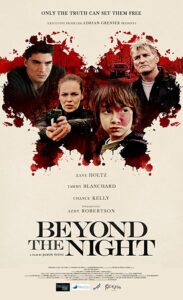The impressively mounted “Beyond the Night” is the inspirational film that isn’t. It’s a kind of modern, religious narrative that knowingly understands that people of faith can endorse sophisticated, mature stories without sacrificing bite and reality.


Ray Marrow (Zane Holtz) returns from a tour of duty in the Middle East to find that his wife has been killed in a car accident. He’s left a single father to Lawrence (Azhy Robertson), a slight boy with a distinctive birthmark that covers most of the the right side of his face. Ray’s sister, Caroline (a very good Tammy Blanchard) is a career sheriff’s deputy, who takes her job very seriously. As they lay to rest one of their own, Lawrence begins to say disturbing things both at the funeral and at the subsequent wake. These things are details about the mysterious disappearance of a teen in the town. Could Lawrence have some kind of supernatural ability? What happened to the teen?

Sporting some wonderful cinematography from the lens of Daniel Sharnoff, who contributed camera work to last year’s awards darling “First Reformed,” the modestly budgeted “Beyond the Night” is a top notch production. The story, penned by director Jason Noto, is fascinating and, while it takes it’s time to unfold, it never ceased to hold my attention. And the subtle religious underpinnings make it suitable viewing for the inspirational market, while not exactly fitting into the typical trappings that undercut other religious films.
For his debut feature, writer/director Noto smartly sets the action in a world not too unlike the ones often depicted by filmmaker Debra Granik (see “Winter’s Bone”), who last year gave us the heartfelt and terrific “Leave No Trace.” The rural environment seen in “Beyond the Night” is gritty and familiar, a real place where real people struggle. Surprisingly, Noto even makes the potentially formulaic subplot involving a criminal, who is the father of the missing teen, work without falling completely into cliche. The criminal named Bernie Coleman is played with great menace by Chance Kelly, who is physically imposing, but, also, has a manner that screams danger. This subplot adds significant tension, as the Marrow’s tragedy comes together with that of the Coleman family.

“Beyond the Night” is a tiny production that smartly never tries to do too much or ramp up the action to unrealistic levels. The supernatural element coalesces sympathetically with the religious material without pandering to the viewer. Given Ray’s experiences on the battlefield and what he’s had to come back to, his faith is understandably shaken. And like the questions swirling in a film like “First Reformed,” a movie like “Beyond the Night” provokes the viewer to think deeply about where faith fits in.

Ray, at one point in the film, acknowledges that he isn’t a big believer in the Almighty, but he doesn’t resist a kindly request to pray for him. The unknown out there is just that, not known. And faith takes many forms. It can manifest itself in ways we barely notice and can never fully understand. Sometimes, the words of a child tell us what we need to hear.
